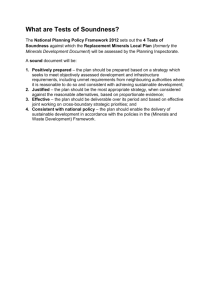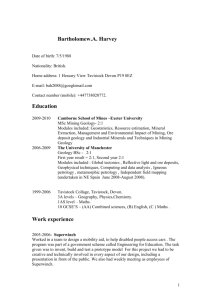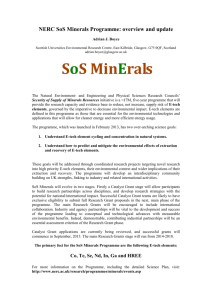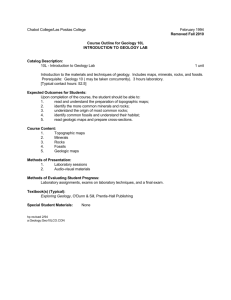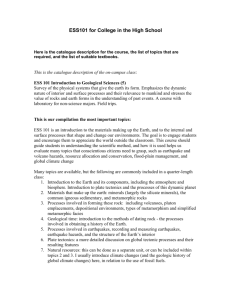NERC SoS Minerals Programme
advertisement
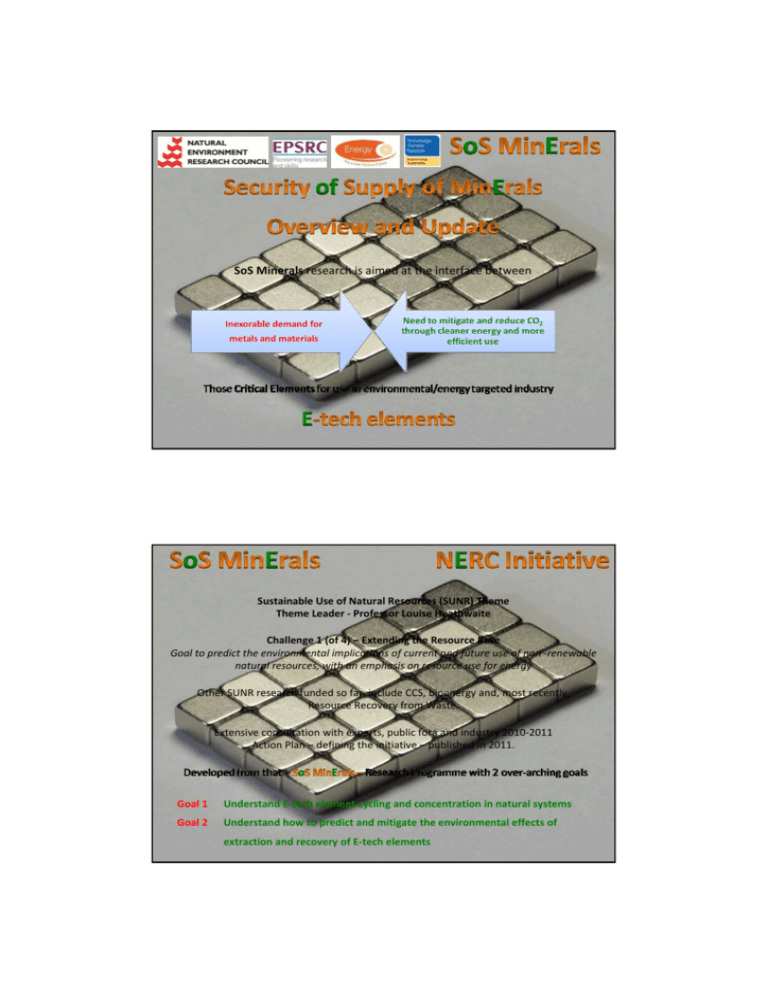
SoS Minerals research is aimed at the interface between Sustainable Use of Natural Resources (SUNR) Theme Theme Leader ‐ Professor Louise Heathwaite Challenge 1 (of 4) – Extending the Resource Base Goal to predict the environmental implications of current and future use of non‐renewable natural resources, with an emphasis on resource use for energy Other SUNR research funded so far, include CCS, bioenergy and, most recently, Resource Recovery from Waste. Extensive consultation with experts, public fora and industry 2010‐2011 Action Plan – defining the initiative – published in 2011. Goal 1 Understand E‐tech element cycling and concentration in natural systems Goal 2 Understand how to predict and mitigate the environmental effects of extraction and recovery of E‐tech elements Adrian Boyce, Professor of Applied Geology, SUERC, Chair Alan Gibbon, Development Director of New Technology, MIRO Hylke Glass, Rio Tinto Professor of Mining and Minerals Engineering, Camborne School of Mines Gus Gunn, Leader, BGS Minerals Sustainability Team, British Geological Survey Barrie Johnson, Professor of Environmental Biotechnology, Bangor University Steve Roberts, Professor of Geology, Soton (NOC) Dan Smith, Lecturer in Applied and Environmental Geology, University of Leicester Mark Tibbet, Professor of Soil Ecology, Cranfield University Frances Wall, Professor and Head of Camborne School of Mines, University of Exeter Bruce Yardley, Professor of Metamorphic Geology, University of Leeds Terms of Reference • advise on the programme’s strategic priorities • refine the programme’s science focus • lay the foundation of a Science Plan • advise on the development of user engagement Review research opportunities from all lists of Critical Metals and Materials Determine specific targets within the bounds of NERCs remit (TAP 3 Challenges) Two goals were defined and E‐Tech elements specified Draft to NERC – re‐refined International Review Science Plan approved and published late 2012 Elements important to environmental technologies Significant knowledge gaps Elements critical to environmental technologies Significant knowledge gaps Li Co Te Se Nd V In Ga HREE Elements important to environmental technologies Some knowledge gaps Elements critical to environmental technologies Some knowledge gaps Nb C PGM Importance to Environmental Technologies Goal 1: Understand E‐tech element cycling and concentration in natural systems Goal 2: Understand how to predict and mitigate the environmental effects of extraction and recovery of E‐tech elements Opportunity for reducing impact Significant science opportunities Ecosystem disturbance Phyto technologies Significant opportunity for reducing impact Significant science opportunities Bio‐processing Co‐product recovery Geometallurgy Ionic Liquids In situ mining Opportunity for reducing impact Some science opportunities Significant opportunity for reducing impact Some science opportunities Mine waters Leaching Importance to Environmental Technologies Goal 1: Understand E‐tech element cycling and concentration in natural systems Goal 2: Understand how to predict and mitigate the environmental effects of extraction and recovery of E‐tech elements Announcement of Opportunity January 2013 Launched at CBI ‐ February 2013 The Catalyst Grants provide development opportunities Evidence gathering, strategic reviews and research needs/impact assessments Planning and hosting of themed 'research challenge workshops' and research meetings Two stages of Implementation Building appropriate research strategies, plans and proposals Catalyst Phase Bringing together working partnerships, collaborations and management mechanisms Main Research Grant Stage (can bring international experts to assist) Developing leading teams and management structures EPSRC involvement – Exciting development Developing Knowledge Exchange and Communication Strategies Now £1M in catalyst pot Importance of Collaboration – Cross‐disciplinarity ‐ NERC‐EPSRC Industrial Partnership/s – Essential Criteria “The direct involvement and contribution of industrial partners will be a sine qua non for the SoS Minerals programme.” Engagement Exploration – Mining – Processing – Refining – End‐users 23 Proposals 131 Investigators 36 Institutes in UK 64 40 11 Engineering Earth and Environmental Sciences Material Sciences Chemistry Biosciences Computing Business Industrial Partners University/Institute Partners Survey/Agency Partners sosminerals@nerc.ac.uk LEARN MORE – JOIN IN Environmental Sustainability Knowledge Transfer Network Dedicated website – with active memberships across Academia, Policy and Industry Google “SoS Minerals Connect” Security of Supply of Mineral Resources (SoS Minerals)


